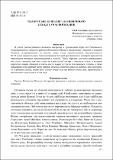| dc.contributor.author | Келемен, Ю. И. | |
| dc.coverage.spatial | Брест | ru_RU |
| dc.date.accessioned | 2020-04-29T09:03:26Z | |
| dc.date.available | 2020-04-29T09:03:26Z | |
| dc.date.issued | 2018 | |
| dc.identifier.citation | Келемен, Ю. И. “Білоруське купалля” на північному заході сучасної Волині / Ю. И. Келемен // Брестчина и соседи : сборник научных трудов / Брестский государственный технический университет, Кафедра белорусского и русского языков, Научно-исследовательская лаборатория по социокультурным проблемам Пограничья ; редкол.: Н. Н. Борсук, Т. Н. Рахуба, З. М. Заика ; под общ. ред. М. П. Жигаловой. – Брест : БрГТУ, 2018. – С. 117–121. – Библиогр.: с. 121 (16 назв.). | ru_RU |
| dc.identifier.uri | https://rep.bstu.by/handle/data/5110 | |
| dc.description | Y. Kelemen. “BELARUSSIAN KUPALLIA” ON THE NORTH-WESTERN PART OF MODERN
VOLYN | ru_RU |
| dc.description.abstract | В статье рассматривается механизм внедрения в купальский обряд сёл Ратновского,
Старовыжевского, Шацкого районов Волынского Полесья белорусских традиций и новаций.
Главным детерминатором, по мнению автора, стала художественная самодеятельность
60-70 годов прошлого века. Ради достижения большей зрелищности в сценарий празднества
привлекался материал, заимствованный у соседей. Таким образом, получили распространение такие элементы, как своз хлама на купальский костёр с помощью телеги, в которую
впрягались парни, вбивание в землю шеста, вокруг которого складывалось топливо, а также
связывание в его верхней части «крижа» (креста), обвитого льном и цветами, что напоминало играющее солнце, разжигание одного общего костра вместо нескольких, привлечения к
выполнению купальских песен хора. | ru_RU |
| dc.language.iso | uk | ru_RU |
| dc.publisher | БрГТУ | ru_RU |
| dc.subject | Купала | ru_RU |
| dc.subject | Волынское Полесье | ru_RU |
| dc.subject | белоруские традиции и новации | ru_RU |
| dc.subject | художественная самодеятельность | ru_RU |
| dc.subject | the Volynsk Polesye | ru_RU |
| dc.subject | belarusian traditions and innovations | ru_RU |
| dc.subject | amateur performances | ru_RU |
| dc.title | “Білоруське купалля” на північному заході сучасної Волині | ru_RU |
| dc.type | Статья (Article) | ru_RU |
| dc.identifier.udc | 811.161.2 | ru_RU |
| dc.abstract.alternative | The customs of Kupala in the villages of Ratne, Stara Vyzhva and Shatsk districts of Volyn
Polissya differ significantly from those that are practiced on the rest of the territory of the region.
The author believes that the reason why the new elements of the custom appeared and some old traditional
ones were forgotten is that they were loaned from Belarussian amateur arts, which only
strive for entertainment. This process has started in the 60th-70th of the last century. The respondents,
who were the main participants of these celebrations reproduce this particular scenario.
This way several elements, such as delivering useless belongings by cart pulled by the boys to
Kupala bonfire, hammering a pole into the ground, putting whatever was to be burnt around it, attaching
“kryzh” which was tied up with the wreaths, resembling the play of the sun, on top of the
pole, setting one general bonfire instead of several ones, and having a choir singing kupala songs,
were circulated.
In these districts kupala custom is practiced in just several villages, mostly located close to the
border, particularly in Hutj of Ratne district kupala songs are called petrivky, which proves that the
custom is not traditional, in Pishcha of Shatsk district, where these activities are observed from at least the beginning of the XX century, in the villages called Yarevyshche of Stara Vyzhva district,
where within the last years certain objects were Christianized, for instance installation of the icons
into “kupailytsya” – the willow branch decorated with the flowers, which is considered to be the
main element of this holiday in Volyn and is almost not known in Western Polissya. However in
Myziv of Stara Vyzhva district, which is located further from Ukrainian-Belarussian administrative
border, the old traditions are forgotten and the new ones haven’t been applied. This is an additional
proof that they were introduced artificially. | ru_RU |
